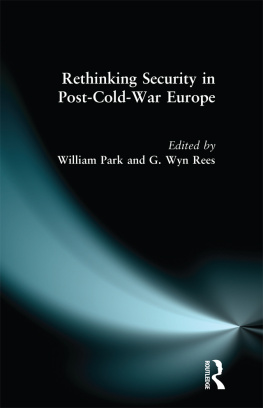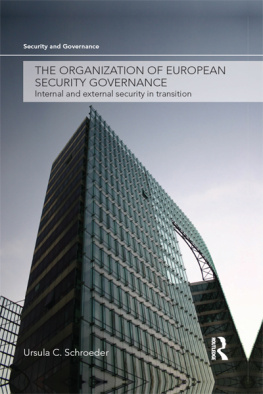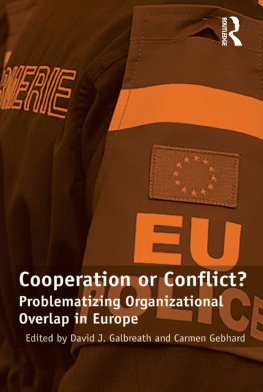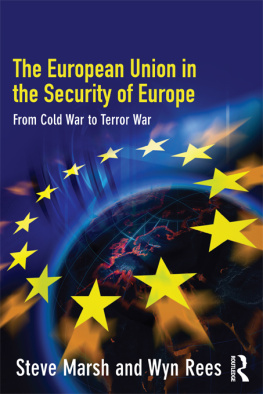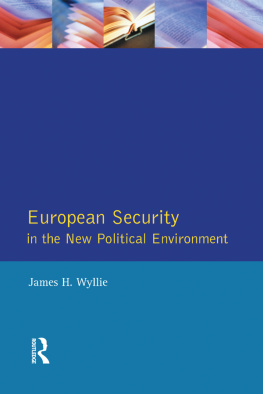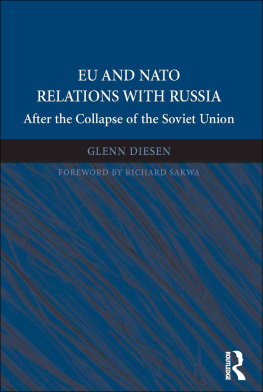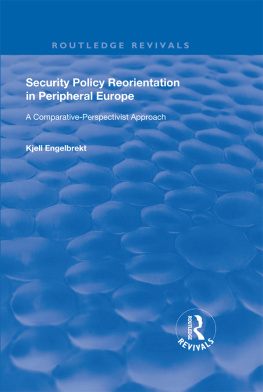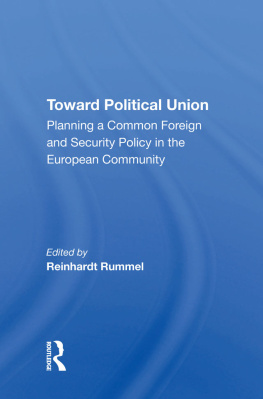Rethinking Security in Post-Cold War Europe
edited by William Park and G. Wyn Rees
First published 1998 by Addison Wesley Longman Limited
Published 2014 by Routledge
2 Park Square, Milton Park, Abingdon, Oxon OX14 4RN
711 Third Avenue, New York, NY 10017, USA
Routledge is an imprint of the Taylor & Francis Group, an informa business
Copyright 1998, Taylor & Francis.
The right of William Park and G. Wyn Rees to be identified as the editors of this work has been asserted by them in accordance with the Copyright, Designs and Patents Act 1988.
All rights reserved. No part of this book may be reprinted or reproduced or utilised in any form or by any electronic, mechanical, or other means, now known or hereafter invented, including photocopying and recording, or in any information storage or retrieval system, without permission in writing from the publishers.
Notices
Knowledge and best practice in this field are constantly changing. As new research and experience broaden our understanding, changes in research methods, professional practices, or medical treatment may become necessary.
Practitioners and researchers must always rely on their own experience and knowledge in evaluating and using any information, methods, compounds, or experiments described herein. In using such information or methods they should be mindful of their own safety and the safety of others, including parties for whom they have a professional responsibility.
To the fullest extent of the law, neither the Publisher nor the authors, contributors, or editors, assume any liability for any injury and/or damage to persons or property as a matter of products liability, negligence or otherwise, or from any use or operation of any methods, products, instructions, or ideas contained in the material herein.
ISBN 13: 978-0-582-30376-8 (pbk)
British Library Cataloguing-in-Publication Data
A catalogue record for this book is available from the British Library
Library of Congress Cataloging-in-Publication Data
Rethinking security in post-Cold War Europe / edited by William Park
and G. Wyn Rees.
p. cm.
Includes bibliographical references and index.
ISBN 0-582-30376-1 (pbk.)
1. EuropePolitics and government1989- 2. National security
-Europe. 3. EuropeDefenses. I. Park, William, 1951
II. Rees, G. Wyn, 1963
D2009.R48 1998
Set by 7 in 10/11 Times
Clive Archer is Research Professor in the Department of Politics and Philosophy at Manchester Metropolitan University. He has published extensively on security issues, particularly relating to northern Europe. He is the author, with Fiona Butler, of The European Union Structure and Process (second edition, Pinter 1996).
Andrew Cottey lectures in the Department of Peace Studies, University of Bradford. He has recently spent a year at the Institute for East-West Studies, Warsaw, and is the author of East-Central Europe after the Cold War; Poland, the Czech Republic, Slovakia and Hungary in Search of Security (Macmillan/St Martin's 1995).
Trine Flockhart is Senior Lecturer in Politics and International Relations at the University of Sunderland. She is the editor of a volume entitled From Vision to Reality: Implementing Europe's New Security Order (Westview forthcoming).
James Gow is Reader at the Department of War Studies, King's College, London. He is well known for his writing on Yugoslavia in particular, and his most recent book is Triumph of the Lack of Will: International Diplomacy and the Yugoslav War (Hurst Columbia University Press 1997).
Adrian Hyde-Price lectures at the Institute for German Studies at the University of Birmingham. He has published widely on European security issues, and his most recent book is The International Politics of East Central Europe (Manchester University Press 1996).
Paul Latawski is an Associate Fellow at the Royal United Services Institute and a lecturer at the School of Slavonic and East European Studies, London University. He has published widely on central European security issues, including The Security Road to Europe: The Vise grad Four (RUSI 1994).
William Park is Principal Lecturer at the Joint Services Command and Staff College, Bracknell. In addition to a book, Defending the West; a History of NATO (Wheatsheaf 1986), he has published a number of chapters and articles on NATO. He has also just completed a chapter on NATO's role in implementing Europe's new security order, for publication in a volume edited by Trine Flockhart.
G. Wyn Rees lectures in International Relations at the University of Leicester. He researches in the field of European security and recently held a NATO Research Fellowship. His most recent book is Anglo-American Approaches to Alliance Security (Macmillan 1996) and he has a forthcoming book on the Western European Union with Westview Press.
Claire Spencer is Deputy Director of the Centre for Defence Studies, King's College, London. She has published widely on Mediterranean security and the Maghreb, including an Adelphi Paper in 1993, and she has recently written a piece on confidence-building measures in the Mediterranean region for Mediterranean Politics (forthcoming).
CHAPTER 1
Introduction: rethinking European security
WILLIAM PARK
The transformation of the European security order associated with the demise of the Cold War created the opportunity, and some argued the necessity, to develop a security architecture more specifically suited to the 'wider Europe's' circumstances (Miall 1994b). If a truly 'common European home' was to emerge, then common European institutions would be needed both to represent and to manage it. The most entrenched institutions, however, were the North Atlantic Treaty Organisation (NATO) and the European Union (EU). In such a Europe, perhaps the main impact of the collapse of totalitarianism in the East would be that the region's inhabitants would now be afforded a clearer view of what it was they were being denied.
However, perhaps we should not be too surprised that the dominant trend in the post-Cold War restructuring of Europe's political landscape has been the opening of the West to incorporate the former East, rather than the dismantling of the West's institutional structures to create an entirely new architecture. In this light, the rather unceremonious absorption of the German Democratic Republic by the Federal Republic (Kelleher 1992) could be seen as just the first manifestation of a broader and more complex post-Cold War European phenomenon. This process of western 'expansion' is still in its very earliest stages, has many facets to it, and its ultimate outcome remains unclear and uncertain. Indeed, it is a process which might not only be of long duration, but which might never be quite completed. Something had to be done, hope had to be offered, and the West as it had been shaped during the Cold War era was in a position and was obliged to respond. But a reaction is not a plan, a response not the same thing as an objective, and quite where and how far the West might be prepared to go remains unresolved (Wallace 1997).
The legacy
As we ponder the reshaping of Europe, and particularly its security arrangements, we should remind ourselves how complex a phenomenon the Cold War was in reality (Gaddis 1989). It would be both simplistic and unhelpful if we were to remember it as an absolute division of Europe along East-West lines, with each bloc characterised by tight military, ideological and political unity, and driven by unremitting adversarial postures towards the opposing bloc (DePorte 1986). In fact, the reality was far fuzzier. For example, the security policies and military preparedness of NATO's two Balkan member states, Greece and Turkey, were arguably as much directed towards each other as they were towards the common Warsaw Pact threat (Brown 1991). Furthermore, of the Balkan region's Warsaw Pact members, Romania might best be regarded as having been semi-detached (Eyal 1989) while the region also contained two communist-led but non-Pact states in Albania and a Federal Republic of Yugoslavia which incorporated entities as divergent as, say, Slovenia and Kosovo province.

